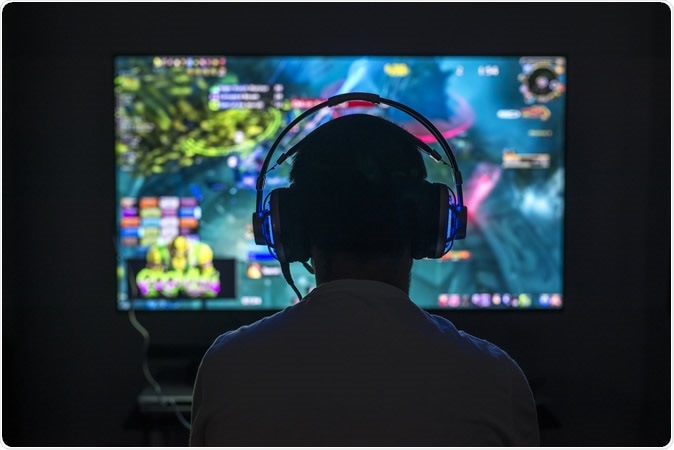Video games have been blamed for emotional damage and numerous behavioural problems in children and teenagers. A new study turned it all around by using video games for an emotional intelligence training program and found that exposure to these games could help these adolescents express and manage their emotions better after the training.

Young gamer playing video games. Image Credit: Sezer66 / Shutterstock
The results of this study titled, “Can Videogames Be Used to Promote Emotional Intelligence in Teenagers? Results from EmotivaMente, a School Program”, were published in the latest issue of the Games for Health Journal from Mary Ann Liebert, Inc. publishers.
Study authors Claudia Carissoli and Daniela Villani, Università Cattolica del Sacro Cuore (Milan, Italy) developed their emotional intelligence (EI) training program using experience-based learning methods including integrated video games. The teenagers they recruited in their study participated in eight such sessions. Before start of the program, each of them underwent an evaluation for emotional competency. At the end of the training and three months after the training ended, their emotional capabilities and EI were tested again.
The team defines EI as “the ability to monitor one's own and others' emotions, to discriminate among them, and to use the emotional information to guide one's thinking and actions,” and adds that it can be “learned and taught”. The authors of the study write that not being able to cope with emotions could lead to, “maladaptive coping strategies such as substance abuse, eating disorders, rumination, avoidance, passive attitudes dealing with emotional situations, or lower emotional self-efficacy.” These skills need to be promoted, they add, for “future well-being”. The team explains that teenagers who have a good level of EI are “internalizing and externalizing at risk behavior, such as mood disorders, impulsivity, anxiety, depression, addictions, and aggression.” They also add that video games could help provide stress relief after “relational or school problems” and may “satisfy intrinsic needs of competence, autonomy, and relatedness, which are in turn associated with emotional regulation, fun, and well-being”. Video games on the other hand are also associated with “frustration, anxiety, sadness, and fear,” they warn.
According to Tom Baranowski, Editor-in-Chief of Games for Health Journal, from USDA/ARS Children's Nutrition Research Center, and Department of Pediatrics, Baylor College of Medicine, Houston, emotional intelligence is a new health issue and could be implicated in several health problems and lack of such emotional intelligence could mean inability to cope with stress. He added, “Carissoli and Villani created a videogame, EmotivaMente, to enhance emotional intelligence among adolescents, perhaps the group that could benefit most. Their preliminary evaluation indicated that playing the game enhanced the students' evaluation and expression of emotions. This is an important first step in designing a game to learn to manage emotions. While the impact was limited, further enhancements to the game may have substantial additional effects. Stay tuned!”
The team included 121 teenagers in their study of which 15.7 percent were boys and the average age of the participants was around 14 years. Each of the eight sessions with EmotivaMente was for around 1.5 hours each. The kids were recruited from two Italian senior high schools.
The team used videogames such as “Slenderman, Flappy Bird, Tap the Frog and Antsmasher.” These helped the participants “recognize their emotional reactions to different experiences, develop awareness about the physiological component of emotions, and recognize interindividual differences,” they explained. Some of the games, “Flow or Yellow” on the other hand, “allowed students to experience different emotion regulation strategies, immediately applicable in their day-to-day lives.” Games like “The End of the World” helped promote empathy because it was about a man who had lost his girlfriend, the authors explain. There was “collaborative play” the team writes. Several questions were put to assess the EI. One of the questionnaires used was the “Emotion Regulation Questionnaire (ERQ)”.
Results revealed that there was a significant improvement in the EI among the students who underwent the training. The study group exposed to the video game were able to express their emotions better and had better control over their emotions compared to those who were controls and were not exposed to the game. In the study 57 and 51 teenagers were finally analyzed as the intervention group and control group respectively. The improvement was not seen three months after the training though. This meant that the benefits of the intervention did not persist, write the researchers.
The authors write, “In summary, EmotivaMente has shown a partial efficacy in promoting changes in EI.” The team agrees that most of their participants were girls and more studies are needed in both genders to assess the efficacy of the intervention. Nevertheless, they concluded, “EmotivaMente helped adolescents to improve emotional skills. Results confirmed that videogames can be useful to promote EI in adolescents at school, if integrated with a guided and assisted framework.”
Journal reference:
Carissoli Claudia, Villani Daniela, Can Videogames Be Used to Promote Emotional Intelligence in Teenagers? Results from EmotivaMente, a School Program, Games for Health Journal, DOI: 10.1089/g4h.2018.0148, https://www.liebertpub.com/doi/abs/10.1089/g4h.2018.0148